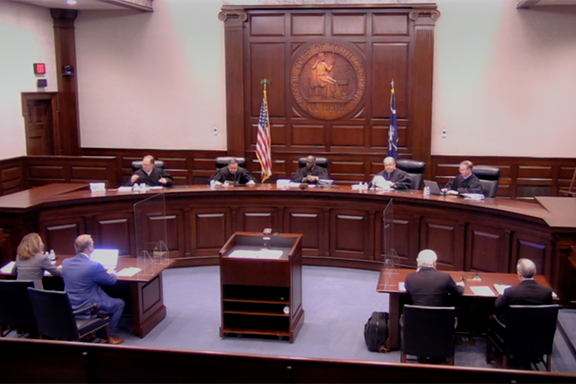South Carolina Supreme Court hears TEC appeal from Judge Dickson’s interpretation of the 2017 Collective Opinions in Church Property Dispute
Columbia, S.C. (December 8, 2021) – Today the South Carolina Supreme Court heard the appeal of Judge Edgar W. Dickson’s interpretation of the high court’s 2017 ruling. On June 19, 2020, South Carolina Circuit Court Judge Edgar W. Dickson granted the motion by the Plaintiffs (The Anglican Diocese of S.C. and Parishes) for clarification and other relief related to the August 2017 ruling of the South Carolina Supreme Court. That ruling had the rare character of consisting of five separate opinions (the “Collective Opinions”). Judge Dickson’s clarification determined that the disassociated parishes and The Anglican Diocese of South Carolina are, “affirmed as the title owners in fee simple absolute of their respective parish real properties.”
The Episcopal Church’s (TEC) arguments at that time that the Dennis Canon alone, or the Canon in conjunction with various pledges of allegiance and the like were sufficient to create a trust under South Carolina law were rejected. Judge Dickson’s ruling clarified the Collective Opinions, explaining that, “the Dennis Canon by itself does not create a legally cognizable trust, nor does it transfer title to property.” This affirmed that those congregations that followed state non-profit guidelines for their disassociation from TEC retained all their real and personal property.
TEC appealed this interpretation of the Courts 2017 collective opinions in July 2020, not on the basis of Judge Dickson’s legal arguments, but only on the assertion that he had no authority to provide any interpretation. Their argument is that his only possible role was to simply enforce what they assert the Court had ruled.
In today’s hearing, the justices were very active in their questioning. The time allotted to both sides legal counsel was exceeded because of the extensive questioning.
The full proceedings of today’s hearing is now available on the Court’s website.
The Anglican Diocese of South Carolina and its parishes remain prayerfully hopeful of their legal position as the owners of their individual real, personal and intellectual property. It is expected that the South Carolina Supreme Court will not announce its ruling on the current appeal until sometime in 2022.
Background
The Anglican Diocese of South Carolina disassociated from The Episcopal Church in the fall of 2012, along with 80% of its congregations and members. That action was taken in response to attempts by TEC to remove the Rt. Rev. Mark Lawrence as Diocesan Bishop. Litigation in this case began the following January. The Diocese and Parishes filed this action seeking a declaratory judgement to clarify the rights of the Diocese and its parishes. In February 2015, the Honorable Judge Diane Goodstein ruled that the Diocese and those parishes in union with it, “are the owners of their real personal and intellectual property and that [TEC and TECSC] have no legal, beneficial or equitable interest in the Diocese’s real, personal and intellectual property.” TEC and TECSC were permanently enjoined from using, assuming or adopting the marks of the Diocese.
Judge Goodstein’s ruling was appealed to the South Carolina Supreme Court, which ruled on August 2, 2017 in the form of five separate opinions. The lack of agreement among those five opinions required clarification. The Diocese and Parishes filed a Motion for Clarification on March 23, 2018.
In his ruling, Judge Dickson made several important conclusions of law. Chief among them was his ruling on the central issue of interpreting the Collective Opinions. As he noted in quoting former Chief Justice Toal, “The Court’s collective opinions in this matter give rise to great uncertainty, so that we have given little to no collective guidance in this case or in church property disputes like this going forward.” He concluded that, “This court must distill the five separate opinions, identify the court’s intent and produce a logical directive.”
With respect to parish property, the law of this case follows the precedent of All Saints Parish, Waccamaw (2009). In his deciding opinion, Chief Justice Beatty, “found that the Dennis Canon, standing alone, does not unequivocally convey an intention to transfer ownership of property to the national church…” In accordance with established South Carolina law, establishment of a trust interest must meet the standard of being “legally cognizable” Judge Dickson concluded there is no evidence that any parish agreed to the Dennis Canon: “This court finds that no parish expressly acceded to the Dennis Canon” and “defendants failed to prove creation of a trust.” He further concluded, “TEC’s argument that their unilaterally drafted Dennis Canon created a trust under South Carolina law is rejected.”
In the matter of the Trustees and St. Christopher Camp and Conference Center, Judge Dickson affirmed that under the All Saints ruling that a non-profit corporation which follows the correct steps to sever its association with another entity does so with all its property interests intact. The Collective Opinions found that the Diocese and Parishes properly disassociated. As Judge Dickson explains, “Applying neutral principles of law, this court finds the Diocese and Parishes properly disassociated and control their real and personal property with any improvements thereon. Following the narrowest grounds of the majority in the Collective opinions, this Court finds that Camp St. Christopher should remain as titled in the Trustees of the Protestant Episcopal Church in South Carolina as stated in the 1951 deed.”

